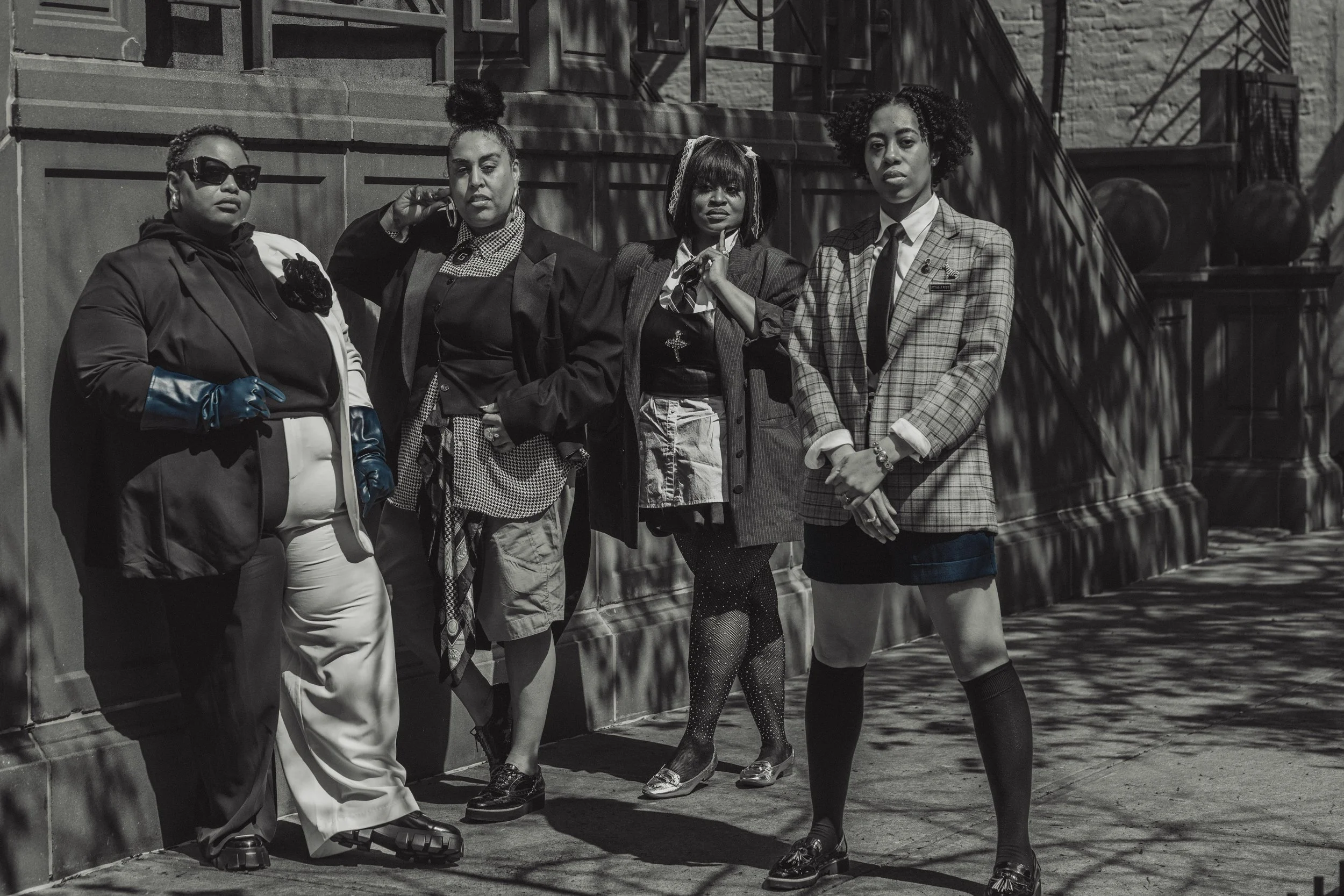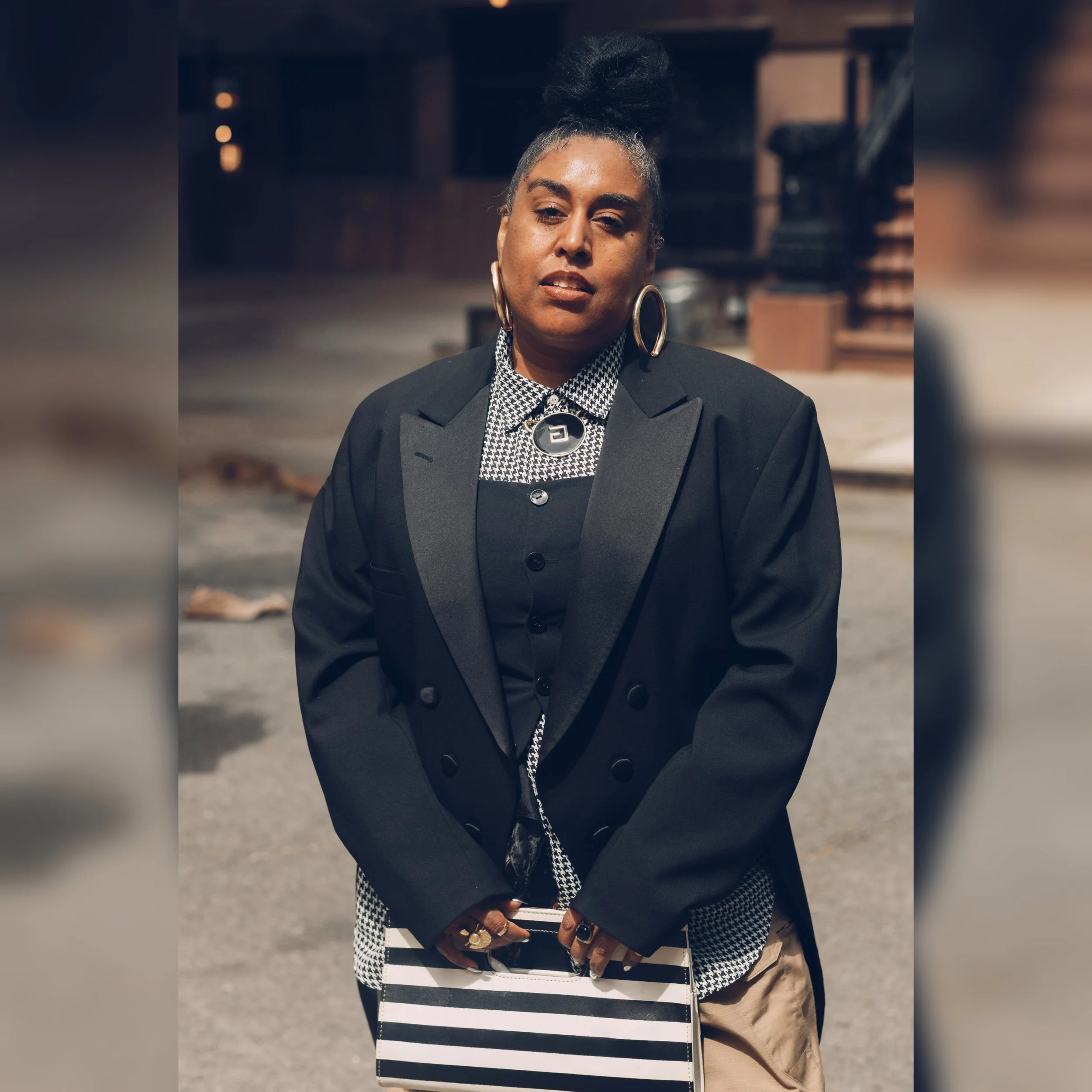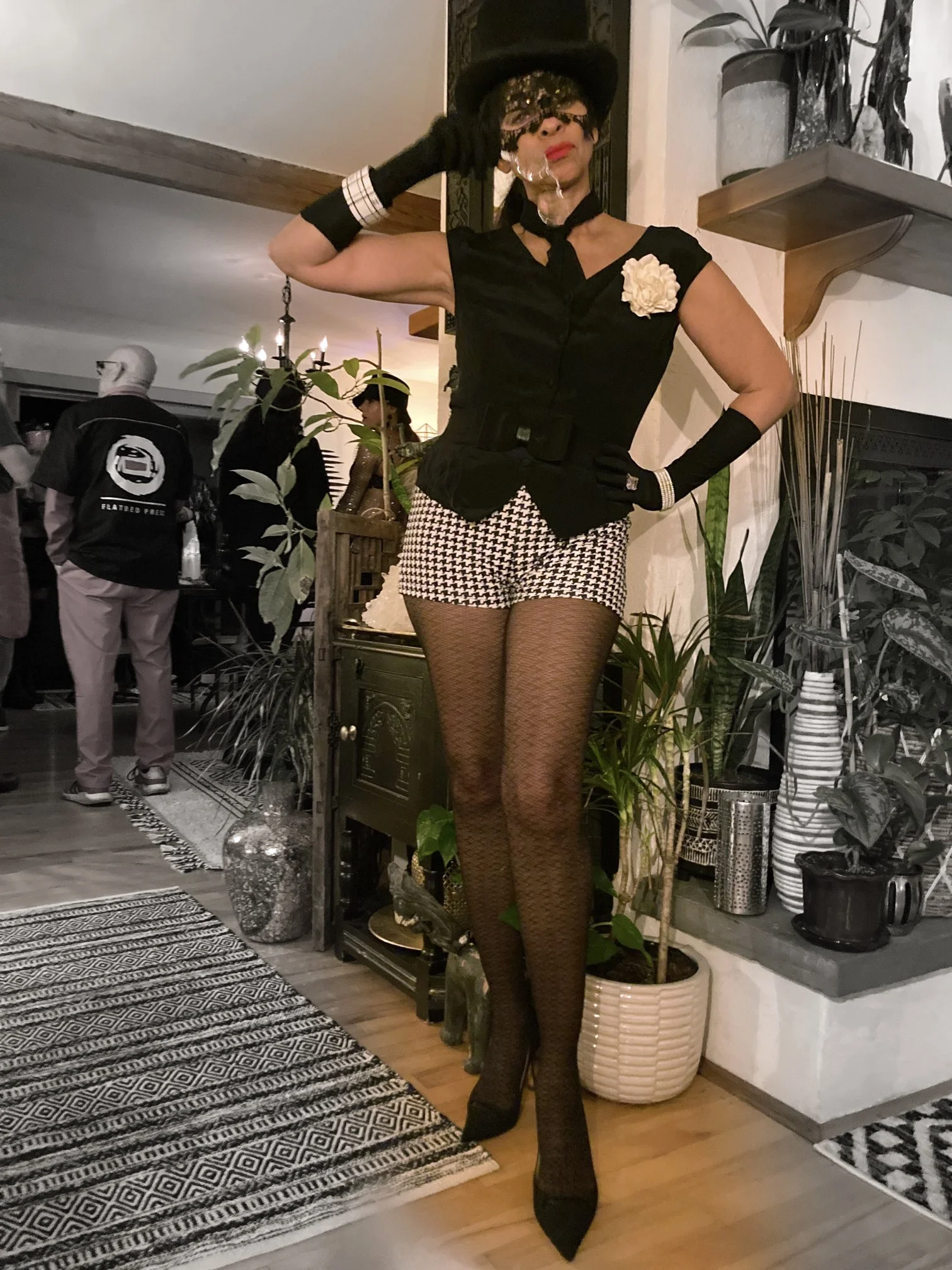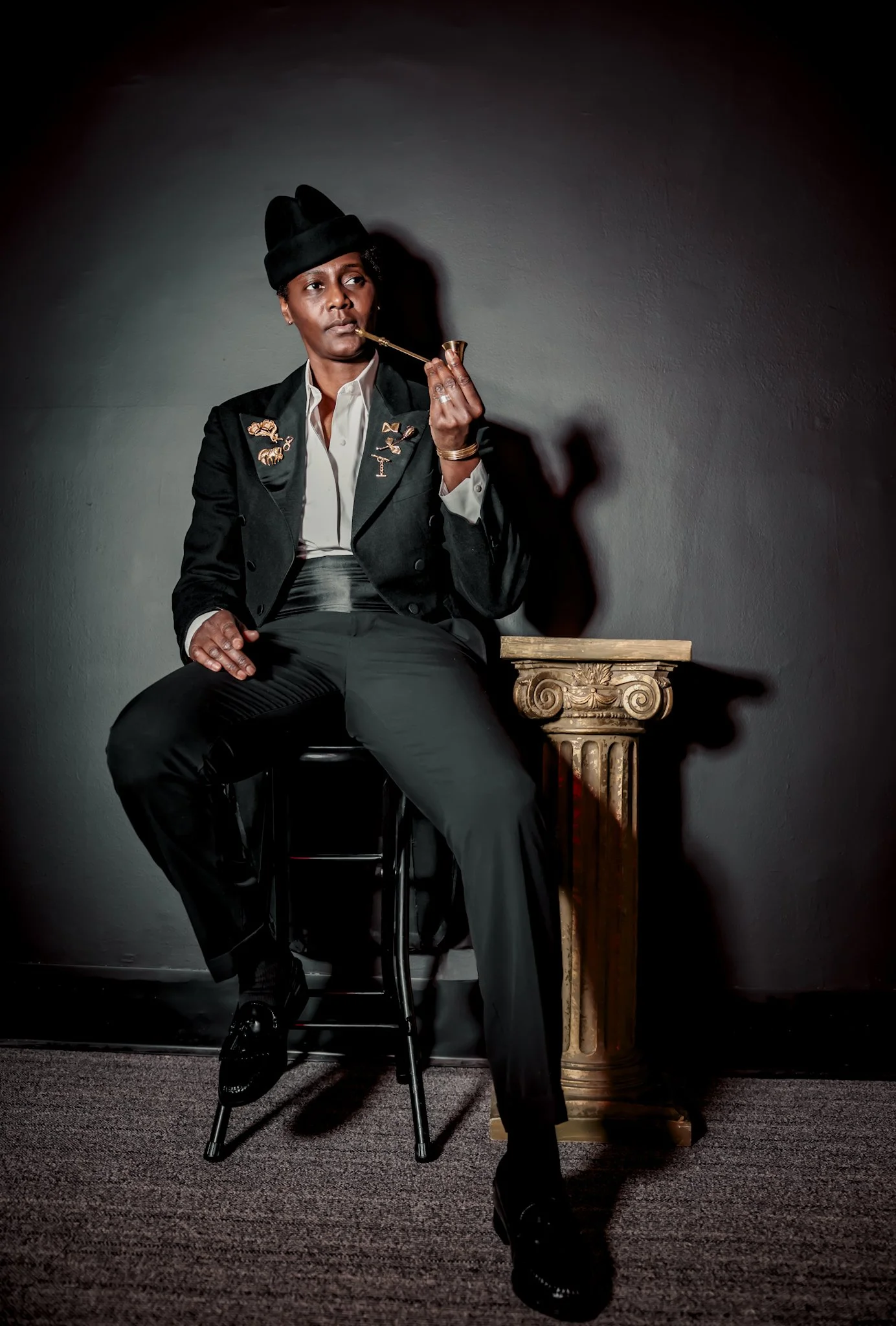Ashley B. Chew
“I aim to emphasize that hair is not merely vanity; it is a wearable archive of history, innovation, and dignity.”
Ashley B. Chew, Courtesy of AshleyBChew.com
“This series explores how hair—particularly in the Black community—serves as an extension of identity, pride, resistance, and self-expression. From intricate braiding to sculptural afros and flamboyant wigs, the artistry of hair reflects not just style, but status, politics, and self-determination.
Salons and Barbershops have also served as safe spaces such as therapy, storytelling, and solace.
Through this work, I aim to emphasize that hair is not merely vanity; it is a wearable archive of history, innovation, and dignity. It speaks to how Black people, especially women and femmes, use their bodies as canvas and statement—often reclaiming beauty on their own terms.”
- Ashley B. Chew
Beauty Supply 02, 2024
Acrylic on Canvas
30" x 40" x 01"
Beauty Supply 03, 2024
Acrylic on Canvas
30" x 40" x 01"
Beauty Supply 05, 2024
Acrylic on Canvas
30" x 40" x 01"
Ashley Chew (b. Chicago, IL) is a Visual Artist based in New York, NY. Chew's paintings focus on the resilience, rest, regality and visibility of marginalized groups. This is a direct contrast of the trauma depicted across mass media. Inviting viewers to reconsider how these moments of pause and dignity are rarely highlighted or celebrated in the context of underrepresented groups.
Chew works across; painting, illustration, murals, installations, dyes, leather goods, hand-lettering, and silkscreening. Chew's work has been featured in Spike Lee's Netflix series "She's Gotta Have It", Bethann Hardison's "Invisible Beauty", "Being Sheryl Lee Ralph"; exhibitions throughout New York City, and is in permanent collection at Centraal Museum in Utrecht, Netherlands.
Clients and Partnerships include: Tommy Hilfiger, Coach, PUMA, Alice + Olivia, supergoop!, Zadig & Voltaire, Nike, The North Face, Kipling, Beyond Yoga x The US Open, Topshop Topman, Pharrell’s Billionaire Girls Club, The Honey Pot Company, Bumble Bizz, ENVSN Fest, Hotel Chocolat, Dress For Success, Color Of Change, Midwest Fashion Week and more. Milk Studios previously named Chew “Artist of The Week”.
Chew has held Artist Talks for The New York Times, The Indianapolis Museum of Art, The Eiteljorg Museum: Steward Speakers, FCDA in Lagos, Nigeria, and Columbia University.
[Bio courtesy of Ashley B. Chew - Website Portfolio]
Nicole Brito
Photographer: @jmonroe
Dandies (from L to R): @nekeyetanewkirk @thriftedsoulsista, @iamjuicyjohnson, and @nyondasnest
Photographer: @jmonroe
Dandy: @thriftedsoulsista
Cheryl Green
“I strive to balance standing out with maintaining a sense of dignity and mystery, especially in predominantly white social circles. ”
Cheryl Green
My aim when I turned 60, was to establish myself as a respected figure in the art community while honoring my cultural roots. I strive to balance standing out with maintaining a sense of dignity and mystery, especially in predominantly white social circles. One of my challenges is navigating spaces where I am a minority, managing perceptions without compromising authenticity. I also seek to find fashion and artistic inspirations that resonate with my identity.
I grew up in New York City, surrounded by a vibrant mix of cultures that fueled my passion for art from an early age. After earning a degree in Communication Design from Parsons, I became an Art Director for many creative agencies, mostly in Manhattan. My appreciation for the Harlem Renaissance is both personal and professional, inspiring my style. When invited to an upscale party in Amagansett, I chose attire inspired by jazz showmen of the Harlem Renaissance, blending dandy fashion with a modern twist.
As one of the few guests of color, I carefully crafted a look that conveyed mystery and exclusivity, while asserting my presence. This approach reflects my ongoing journey to honor my heritage while carving out a unique space in contemporary art and social scenes.
Nissy Marie
The digital painting titled We Buy Gold by Nissy Marie is a striking reflection of Black Dandyism—a cultural aesthetic that merges elegance, resistance, and self-definition.
Through hyper-stylized details such as the elaborately adorned acrylic nails, glinting rings, and a gold nameplate, the work boldly reclaims symbols of wealth and beauty often dismissed or caricatured in mainstream narratives.
The use of ornate gold framing reinforces the regal aura, aligning everyday Black expression with fine art and legacy.
By centering a hand in a pose that exudes pride and intentionality, the piece subverts traditional power symbols and instead uplifts adornment as both armor and art.
In this way, We Buy Gold becomes a visual proclamation of Black joy, autonomy, and the right to luxuriate on one’s own terms.
“We Buy Gold”, by Nissy Marie (2020)
Jakira Scott
“Black Dandyism is storytelling in motion. By the grace of God, I honor where we’ve been, reflect where we are, and envision where we are going—using my art, fashion, style, and storytelling to celebrate God, creativity, beauty, and the power of narrative.””
Jakira Scott, known professionally as Ms. Scott, is a Florida-based multidisciplinary artist and founder of Amor De Lona and Amor De Lona Design.
Her work is deeply rooted in faith, often attributing her strength and success to God’s guidance. Through Amor De Lona, Ms. Scott creates spaces for artists to be seen, supported, and celebrated, reflecting her commitment to fostering a community that honors creativity and artistic expression.
Her dedication to innovation and empowerment in the arts has been recognized with a nomination for the 2025 Domi Innovation Award. Ms. Scott’s journey is a testament to her belief in divine purpose, as she continues to inspire and uplift others through her art and leadership.
“As Dapper Dan said at the 2025 Met Gala, ‘the Dandy creates a narrative.’ My digital drawing, The Abstract Olive, is my part in that narrative, adding to the story of Black Dandyism through art, fashion, and self-expression. Her style communicates resistance; she is grace, and she carries her own narrative.” - Jakira Scott
Anita Dickens
I Dress To Be Seen.
I Dress To Be Heard.
by: Anita Dickens
Growing up, I was taught that clothes speak before you do. That how you walk into a room—the way your collar sits, the press in your slacks, the rhythm in your stride—tells the world who you are and what you will not allow them to forget.
As a Black woman, choosing menswear was never just about fashion. It was about freedom. About giving myself permission to occupy space with authority, elegance, and edge. Where some saw contradiction, I found clarity. In crisp lapels, I felt powerful. In structured jackets and vintage brogues, I found both armor and art.
My love of dandyism came not from wanting to dress like a man, but from wanting to dress like myself—with intention. Like the Black dandies who came before me—those who flipped the script on colonial dress codes and turned style into protest—I wear my clothes as a statement. Tailoring is my truth. Sharpness is my softness. Detail is my defiance.
There’s a legacy in this. In Harlem Renaissance lounges. In South African Sapeurs. In aunties who wore fedoras to church like crowns. I’m not the first Black woman to bend gendered norms of dress, but I walk with them in spirit. And when I step out in full ANE Clothier—strong shoulder, deep indigo, slow-stitched—I’m not just dressing. I’m remembering. I’m reclaiming.
And now, through The Gentlewoman Social Movement, I gather with others who understand this language. Women who wear blazers like declarations. Nonbinary folk who reinvent the silhouette. Elders who pass down stories with the same care they once passed down hand-pressed trousers. Together, we honor our stories in wool, silk, denim, and dialogue.
I don’t wear menswear to disappear. I wear it to say:
“I am here. I am whole. And I define what elegance means on my own terms.”
Anita is also the founder and principal designer at Ane Clothier: “Established in 2014 by Newark, NJ native and visionary designer, Anita Dickens, Ane Clothier is a celebration of the belief that fashion belongs to everyone—him, her, them, they. Our collections stand as a vibrant representation of inclusivity, drawing inspiration from the diverse tapestry of individuals who make up our global community.
At Ane Clothier, Anita envisions a world where fashion is a canvas for self-expression, transcending gender, embracing diversity, and celebrating individuality. Guided by the belief that style knows no boundaries, we strive to create inclusive collections that resonate with the unique stories of every person. Anita's vision is to be a beacon of empowerment, fostering a global community where confidence, authenticity, and sustainability converge seamlessly. Ane Clothier aims to redefine the fashion landscape, inspiring individuals to boldly embrace their identity and make a positive impact on the world through conscious, stylish choices.” - https://aneclothier.com/
Lynette Lashawn
“This isn’t a costume. It’s an inheritance. It’s coded in my DNA.”
A Reflection on Black Tailoring and Legacy
By Lynette Lashawn
Dandyism has always lived in my bloodline— long before I stepped into a showroom or styled a runway. I come from working-class men who dressed with intention, even when the world tried to make them invisible.
My grandfather was a truck driver by day, and a leather-clad biker by night. Sharp in his stance. Unbothered in his presence. He wore grit and gloss in equal measure. My other grandfather spent over 30 years working for Budweiser, and he never left the house without putting it on. To him, dressing well was a sign of self-respect. It was pride in motion. Neither of them ever said the word “dandy”—but they lived it. They practiced a style rooted in dignity, in defiance, in everyday excellence.
And the women? My grandmothers moved through the world like style was second nature. They dressed up because it made them feel good. Because looking like something was a daily act of joy and rebellion. Not for the church pews—for the culture.
So when I wear this black-and-white look, with a tie that reads ICONIC, I’m not just getting dressed—I’m testifying. I’m channeling generations who showed me that being working-class never meant being without class. That tailoring is more than fabric—it’s form, memory, and message. I’m honoring the Superfine: Black Tailoring moment not just through fashion, but through legacy.
This isn't a costume. It's an inheritance. It’s coded in my DNA. I wear them—my grandfathers, my grandmothers—with every lapel, every crease, every cuff. I am the statement.
This reflection is part of a larger conversation powered by Black Girls Know Best, and I’m proud to add my voice to the lineage. Because Black style isn’t borrowed—it’s built. It’s alive. It’s ours.
Photo of Lynette Lashawn, Photographed by Tamera Fleming
Arieal Lynnore
“Black Dandyism, to me, is a powerful blend of resistance and refinement, a legacy I strive to celebrate through every thread, silhouette, and story I create. ”
Arieal Lynnore, 2024 (Photo Courtesy of Arieal Lynnore/@arieallynnore)
Since 2016, Arieal has been crafting unique, custom-made garments that celebrate individuality and style. But she has been sewing a lot longer than that, since 11 years old.
Design Philosophy: Each of her pieces blends elegance with modernity, tailored to create lasting memories for any special occasion.
Creative Vision: Arieal is inspired by those who value unique and meaningful fashion, allowing her space to offer a fresh perspective on contemporary style.
Client Experience: From personalized fittings to exclusive payment plans, Arieal ensures a seamless and memorable journey for every client.
Sustainability: Committed to eco-conscious practices
Her contributions to Superfine & Superfly: Black Girls Explore Black Dandyism were crafted through original fashion sketches, digital renderings, and a reflective mood board. Her work is rooted in her personal journey: from crafting dresses for her Barbie dolls as a young girl to designing bold, colorful garments that pay homage to the rich elegance and individuality of Black style today.
Inspired by Black dandyism, her latest trio of designs celebrates self-expression, elegance, and cultural pride.
Each look reinterprets traditional menswear through a distinctly feminine and artistic lens.
Bold prints, structured tailoring, and exaggerated silhouettes meet vibrant colors, layered textures, and poetic styling.
From the oversized patchwork skirt to the sharply collared cropped shirts and eclectic accessories, these pieces honor the legacy of Black dandies who used fashion as resistance, identity, and art.
This mood board celebrates the essence of Black dandyism. A bold and expressive tribute to Black excellence, style, and individuality. Through tailored silhouettes, rich textures, and fearless color, it highlights the unique way Black creatives use fashion as a language of resistance, elegance, and identity. Each image reflects a narrative of pride, power, and legacy, where every garment becomes a declaration of culture and self-worth. - Arieal Lynnore
























